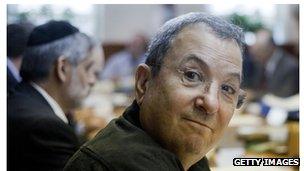Israel Defence Minister Ehud Barak quits politics
- Published

The Israeli Defence Minister, Ehud Barak, has announced that he is quitting politics and will not be contesting January's general election.
Mr Barak, a former military chief of staff who served as prime minister from 1999 to 2001, said he would now concentrate on his personal life.
"I want to study, to write, to live and have a good time," he told reporters.
The 70 year old will remain as defence minister, a post he has held since 2007, until a new government is formed.
On his Twitter feed, Prime Minister Benjamin Netanyahu thanked Mr Barak for his service of his country, adding that he appreciated "his contribution to security of state".
The BBC's Kevin Connolly says Mr Barak believes this month's military offensive on Gaza was a successful note on which to end a long career in Israel's military and political establishment.
At least 158 Palestinians and six Israelis were killed in the eight-day operation, which Israel said was aimed at ending rocket-fire from Palestinian militants.
Commando
Mr Barak served in the Israel Defense Forces (IDF) from 1959 until 1995.
He saw action as an undercover commando, served with distinction in the 1973 Middle East war, and oversaw two daring operations to free Israeli hostages on hijacked planes.
Mr Barak led the 1972 operation against Palestinian militants from the Black September group who had seized a Sabena flight and forced it to land at Lod (now Ben Gurion) airport, in Israel.
Dressed as a ground technician, he convinced the hijackers that the plane needed repairing and quickly overpowered them, killing two men and capturing two women. Mr Netanyahu served under Mr Barak on that raid.
Four years later, Mr Barak was one of the architects of the raid on Entebbe airport in Uganda to rescue another plane of Israelis also being held hostage by Black September.
In 1991, he was appointed chief of the general staff of the IDF. During his four years in the post, he helped implement the Oslo Accords and participated in peace talks with Jordan.
On his resignation from the military, Mr Barak joined the Labour-led government of Yitzhak Rabin as interior minister. After Rabin's assassination in 1995, he served as foreign minister in the government of Shimon Peres until its fall in 1996.
Mr Barak was elected leader of the Labour party and defeated Benjamin Netanyahu in the 1999 prime ministerial election on a manifesto which included the promise to withdraw from southern Lebanon and push for a permanent peace deal with the Palestinians.
He made good on the first pledge in 2000 and also held detailed negotiations on final status issues with the late Palestinian leader, Yasser Arafat. However, Mr Barak's coalition government collapsed in 2001 and he lost the premiership to Ariel Sharon. Mr Barak subsequently resigned both as leader of Labour and as a member of Israel's parliament.
Mr Barak returned to frontline politics in 2007 after he regained the leadership of Labour and then joined Ehud Olmert's ruling coalition as defence minister. He has held that post for the past five years, despite leaving Labour to form his own Independence party.
Mr Barak said he had been considering his decision for the past few weeks and said he would now spend more time with his family, despite opinion polls showing increased support for his party following this month's Gaza offensive.
He added: "I feel I have exhausted my political activity, which had never been an object of desire for me. There are many ways for me to serve the country, not just through politics."
But our correspondent says it is not impossible that he is invited to return to any future Netanyahu government despite no longer holding a seat in parliament.
- Published6 February 2009
- Published24 September 2012